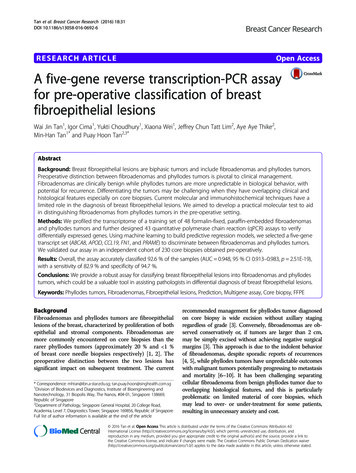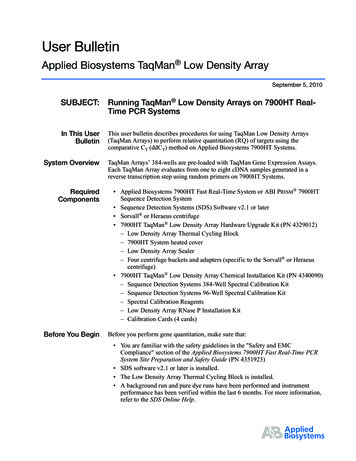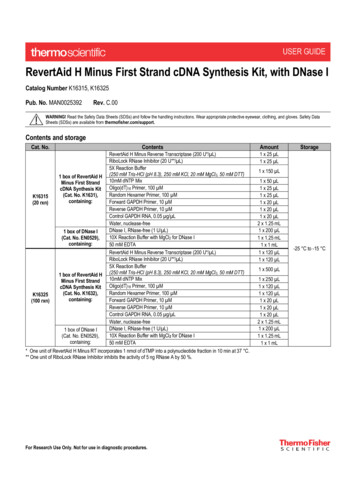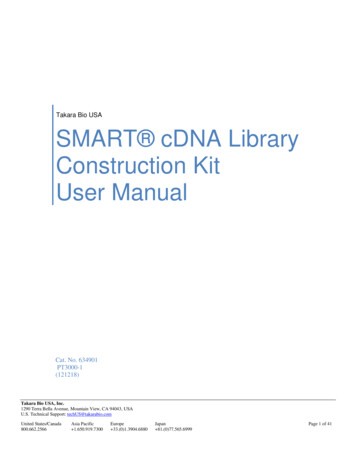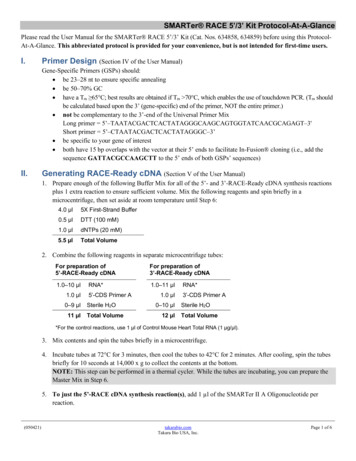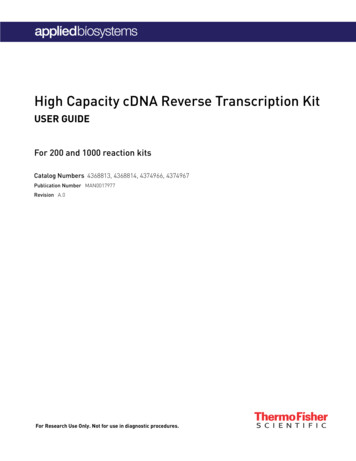
Transcription
High Capacity cDNA Reverse Transcription KitUSER GUIDEFor 200 and 1000 reaction kitsCatalog Numbers 4368813, 4368814, 4374966, 4374967Publication Number MAN0017977Revision A.0For Research Use Only. Not for use in diagnostic procedures.
Manufacturer: Thermo Fisher Scientific Baltics UAB V.A. Graiciuno 8, LT-02241 Vilnius, LithuaniaThe information in this guide is subject to change without notice.DISCLAIMER: TO THE EXTENT ALLOWED BY LAW, THERMO FISHER SCIENTIFIC INC. AND/OR ITS AFFILIATE(S) WILL NOT BE LIABLE FOR SPECIAL,INCIDENTAL, INDIRECT, PUNITIVE, MULTIPLE, OR CONSEQUENTIAL DAMAGES IN CONNECTION WITH OR ARISING FROM THIS DOCUMENT,INCLUDING YOUR USE OF IT.Revision history: Revision history of Pub. no. MAN0017977RevisionDateA.016 July 2018DescriptionBaseline for this revision history.Important Licensing Information: These products may be covered by one or more Limited Use Label Licenses. By use of these products, you acceptthe terms and conditions of all applicable Limited Use Label Licenses.Trademarks: All trademarks are the property of Thermo Fisher Scientific and its subsidiaries unless otherwise specified. TaqMan is a registeredtrademark of Roche Molecular Systems, Inc., used under permission and license. 2018 Thermo Fisher Scientific Inc. All rights reserved.
Contents Product information . . . . . . . . . . . . . . . . . . . . . . . . . . . . . . . . . . . . . . . . . . . . . . . . . . . . . . . 5Product description . . . . . . . . . . . . . . . . . . . . . . . . . . . . . . . . . . . . . . . . . . . . . . . . . . . . . . . . . . . . . 5Available kits . . . . . . . . . . . . . . . . . . . . . . . . . . . . . . . . . . . . . . . . . . . . . . . . . . . . . . . . . . . . . . . . . . . 5Contents and storage . . . . . . . . . . . . . . . . . . . . . . . . . . . . . . . . . . . . . . . . . . . . . . . . . . . . . . . . . . . . 6Required materials not supplied . . . . . . . . . . . . . . . . . . . . . . . . . . . . . . . . . . . . . . . . . . . . . . . . . . 6Workflow . . . . . . . . . . . . . . . . . . . . . . . . . . . . . . . . . . . . . . . . . . . . . . . . . . . . . . . . . . . . . . . . . . . . . . 7 Methods . . . . . . . . . . . . . . . . . . . . . . . . . . . . . . . . . . . . . . . . . . . . . . . . . . . . . . . . . . . . . . . . . . . . . 8Guidelines for template RNA . . . . . . . . . . . . . . . . . . . . . . . . . . . . . . . . . . . . . . . . . . . . . . . . . . . . . 8Reverse transcription reaction guidelines . . . . . . . . . . . . . . . . . . . . . . . . . . . . . . . . . . . . . . . . . . 8Prepare the 2X RT master mix (20-μL reaction) . . . . . . . . . . . . . . . . . . . . . . . . . . . . . . . . . . . . . 9Prepare the reverse transcription reactions . . . . . . . . . . . . . . . . . . . . . . . . . . . . . . . . . . . . . . . . 9Perform reverse transcription . . . . . . . . . . . . . . . . . . . . . . . . . . . . . . . . . . . . . . . . . . . . . . . . . . . 10 APPENDIX A PCR good laboratory practices . . . . . . . . . . . . . . . . . . . . . . . . . 11Good laboratory practices for PCR and RT-PCR . . . . . . . . . . . . . . . . . . . . . . . . . . . . . . . . . . . . 11 APPENDIX B Results from reverse transcription . . . . . . . . . . . . . . . . . . . . 12Quantitative PCR . . . . . . . . . . . . . . . . . . . . . . . . . . . . . . . . . . . . . . . . . . . . . . . . . . . . . . . . . . . . . . . 12Yields for different targets . . . . . . . . . . . . . . . . . . . . . . . . . . . . . . . . . . . . . . . . . . . . . . . . . . . . . . 13Yields for different targets . . . . . . . . . . . . . . . . . . . . . . . . . . . . . . . . . . . . . . . . . . . . . . . . . . . . . . 14 APPENDIX C Accessory products . . . . . . . . . . . . . . . . . . . . . . . . . . . . . . . . . . . . . 16Accessory products . . . . . . . . . . . . . . . . . . . . . . . . . . . . . . . . . . . . . . . . . . . . . . . . . . . . . . . . . . . . 16 APPENDIX D Safety . . . . . . . . . . . . . . . . . . . . . . . . . . . . . . . . . . . . . . . . . . . . . . . . . . . . . 17Chemical safety . . . . . . . . . . . . . . . . . . . . . . . . . . . . . . . . . . . . . . . . . . . . . . . . . . . . . . . . . . . . . . . . 18Biological hazard safety . . . . . . . . . . . . . . . . . . . . . . . . . . . . . . . . . . . . . . . . . . . . . . . . . . . . . . . . . 19High-Capacity cDNA Reverse Transcription Kit User Guide3
Contents APPENDIX E Documentation and support . . . . . . . . . . . . . . . . . . . . . . . . . . . . 20Customer and technical support . . . . . . . . . . . . . . . . . . . . . . . . . . . . . . . . . . . . . . . . . . . . . . . . . 20Limited product warranty . . . . . . . . . . . . . . . . . . . . . . . . . . . . . . . . . . . . . . . . . . . . . . . . . . . . . . . 204High-Capacity cDNA Reverse Transcription Kit User Guide
Product informationIMPORTANT! Before using this product, read and understand the information in the“Safety” appendix in this document.Product descriptionThe Applied Biosystems High-Capacity cDNA Reverse Transcription Kit contains allthe reagents needed for reverse transcription (RT) of up to 2 µg of total RNA to singlestranded cDNA in a 20 µL reaction. The cDNA prepared using the kit is suitable forquantitative PCR, archival storage, or conversion to cRNA.The random primer method is used for initiating cDNA synthesis, and ensure thatfirst strand synthesis occurs efficiently with all species of RNA molecules present,including mRNA and rRNA. The kit has been tested extensively against various RNAtemplates, including G/C-rich and A/U-rich RNA species. The effect of relative mRNAabundance was also examined to see if the reverse transcriptase reaction generatesproducts in a manner directly dependent to the amount of input RNA template. In allcases, quantitative conversion of mRNA and 18S ribosomal RNA species wasobserved.Available kitsKitCat. No.High-Capacity cDNA Reverse Transcription Kit, 200reactions4368814High-Capacity cDNA Reverse Transcription Kit, 1000reactions4368813High-Capacity cDNA Reverse Transcription Kit with RNaseInhibitor, 200 reactions4374966High-Capacity cDNA Reverse Transcription Kit with RNaseInhibitor, 1000 reactions4374967High-Capacity cDNA Reverse Transcription Kit User Guide5
Product informationContents and storageContents and storageCat. No.Contents436881343749674368814437496610X RT Buffer2 1.0 mL2 1.0 mL1 1.0 mL1 1.0 mL10X RT Random Primers2 1.0 mL2 1.0 mL1 1.0 mL1 1.0 mL25X dNTP Mix (100 mM)1 1.0 mL1 1.0 mL1 0.2 mL1 0.2 mLMultiScribe ReverseTranscriptas (50 U/μL)1 1.0 mL1 1.0 mL2 0.1 mL2 0.1 mL—5 200 μL—1 200 μLRNase InhibitorStorage–25 C to –15 CRequired materials not suppliedUnless otherwise indicated, all materials are available through thermofisher.com.MLS: Fisher Scientific (fisherscientific.com) or other major laboratory supplier.ItemSourceNuclease-free waterMLSPipette tips, aerosol-resistantMLSPipettes, MLSDisposable glovesMLSCentrifuge ( 3,000 g (rcf), temperature controlled)MLSReagent Tubes with Caps, 10-mLMLS6High-Capacity cDNA Reverse Transcription Kit User Guide
Product informationWorkflowWorkflowPrepare 2X reverse transcription master mixAdd RNA to reverse transcription reactionsPerform reverse transcription in a thermal cyclerUse the cDNA directly forquantitative or other PCRapplicationsHigh-Capacity cDNA Reverse Transcription Kit User GuideStore the cDNA (2 C to 6 C shortterm, 25 C to 15 C long-term)7
MethodsGuidelines for template RNAObserve the following guidelines to ensure optimal performance when using theHigh-Capacity cDNA Reverse Transcription Kit. Use up to 2 µg of total RNA per 20-µL reaction. Dissolve RNA in PCR-compatible buffer or water. Ensure RNA is free of inhibitors of reverse transcription and PCR. Ensure RNA is free of RNase activity. If you suspect that the RNA contains RNaseactivity, add RNase Inhibitor to the reverse transcription reaction at a finalconcentration of 1 U/µL.Reverse transcription reaction guidelinesThe kit contains reagents that, when combined, form a 2X reverse transcription (RT)master mix. An equal volume of RNA sample should be added. To avoid RNasecontamination, RNase-free reagents and consumables must be used.8High-Capacity cDNA Reverse Transcription Kit User Guide
MethodsPrepare the 2X RT master mix (20-μL reaction)Prepare the 2X RT master mix (20-μL reaction)1. Allow the kit components to thaw on ice.2. Calculate the volume of components needed to prepare the required number ofreactions.Note: Prepare the RT master mix on ice.VolumeComponentwith RNase Inhibitorwithout RNaseInhibitor10X RT Buffer2.0 µL2.0 µL25X dNTP Mix (100 mM)0.8 µL0.8 µL10X RT Random Primers2.0 µL2.0 µLMultiScribe ReverseTranscriptase1.0 µL1.0 µLRNase Inhibitor1.0 µL—Nuclease-free H2O3.2 µL4.2 µLTotal per reaction10.0 µL10.0 µL IMPORTANT! Include additional reactions in the calculations to provide excessvolume for the loss that occurs during reagent transfers.3. Place the 2X RT master mix on ice and mix gently.Prepare the reverse transcription reactions1. Pipette 10 µL of 2X RT master mix into each well of a 96-well reaction plate orindividual tube.2. Pipette 10 µL of RNA sample into each well, pipetting up and down two times tomix.3. Seal the plates or tubes.4. Briefly centrifuge the plate or tubes to spin down the contents and to eliminateany air bubbles.5. Place the plate or tubes on ice until you are ready to load the thermal cycler.High-Capacity cDNA Reverse Transcription Kit User Guide9
MethodsPerform reverse transcriptionPerform reverse transcription1. Program the thermal cycler using the conditions below.IMPORTANT! These conditions are optimized for use with the High-CapacitycDNA Reverse Transcription Kit.SettingsStep 1Step 2Step 3Step 4Temp.25 C37 C85 C4 CTime10 minutes120 minutes5 minutesHold2. Set the reaction volume to 20 µL.3. Load the reaction plates or tubes into the thermal cycler.4. Start the thermal cycler run.10High-Capacity cDNA Reverse Transcription Kit User Guide
APCR good laboratory practicesGood laboratory practices for PCR and RT-PCRWhen preparing samples for PCR or RT-PCR amplification: Wear clean gloves and a clean lab coat.– Do not wear the same gloves and lab coat that you have previously usedwhen handling amplified products or preparing samples. Change gloves if you suspect that they are contaminated. Maintain separate areas and dedicated equipment and supplies for:– Sample preparation and reaction setup.– Amplification and analysis of products. Do not bring amplified products into the reaction setup area. Open and close all sample tubes carefully. Avoid splashing or spraying samples. Keep reactions and components capped as much as possible. Use a positive-displacement pipettor or aerosol-resistant barrier pipette tips. Clean lab benches and equipment periodically with 10% bleach solution or DNAdecontamination solution.High-Capacity cDNA Reverse Transcription Kit User Guide11
BResults from reverse transcriptionQuantitative PCRTo determine the yield of the cDNA from the reverse transcription of total RNA, usequantitative PCR to test various input amounts of RNA for the cDNA yield ofdifferent gene targets.The following table lists some targets and available Applied Biosystems kits that canbe used to evaluate the yield of cDNA conversion.Kit nameGene target Cat. No.18STaqMan Ribosomal RNA Control Reagents4308329GAPDHTaqMan GAPDH Control Reagents (Human)402869GAPDHTaqMan Rodent GAPDH Control Reagents4308313β-actinTaqMan β-actin Detection Reagents401846Other TaqMan Gene Expression Assays can be used to evaluate the yield of cDNAconversion. For a list of available assays, go to thermofisher.com.12High-Capacity cDNA Reverse Transcription Kit User Guide
Appendix B Results from reverse transcriptionYields for different targetsBYields for different targetsFor the example in this appendix, the input total RNA was obtained from human Rajicells, and the RNA was converted to cDNA using the High-Capacity cDNA ReverseTranscription Kit. Figure 1 shows an example of quantitative PCR results from thecDNA for 11 different gene targets, which vary in expression levels.Figure 1 The expected CT values of 3.3 for each tenfold increase in the RNA inputquantity are obtained for 11 different RNA transcripts converted to cDNA from differentinput quantities of total RNA.Note: The amplicon for β2-microglobulin in this study was specifically designed tobe A/U rich. The threshold cycle (CT) values are plotted against RNA input amountsof 0.1, 1.0, and 10.0 µg in 100-µL reactions.High-Capacity cDNA Reverse Transcription Kit User Guide13
BAppendix B Results from reverse transcriptionYields for different targetsYields for different targetsTo achieve optimal conversion, allow reverse transcription to occur for 120 minutes at37 C. Figures 2, 3, and 4 show CT values plotted against reaction time in minutes forthree different targets (18S, GAPDH, and β2-microglobulin) and three input amountsof RNA (0.1, 1.0, and 10.0 µg in 100-µL reactions).Figure 2 The rate of conversion of 18S RNA to cDNA reaches a maximum at 120 minuteswith 10 µg of input RNA and at 30 minutes or less with 0.1 to 1.0 µg of input RNA (based on100-µL reactions).Figure 3 The rate of conversion of GAPDH RNA to cDNA reaches a maximum at 60minutes or less at all RNA input levels (based on 100-µL reactions).14High-Capacity cDNA Reverse Transcription Kit User Guide
Appendix B Results from reverse transcriptionYields for different targetsBFigure 4 The rate of conversion of β2-microglobulin RNA to cDNA reaches a maximum at60 minutes or less at all RNA input levels (based on 100-µL reactions).High-Capacity cDNA Reverse Transcription Kit User Guide15
CAccessory productsAccessory productsUnless otherwise indicated, all materials are available through thermofisher.com.MLS: Fisher Scientific (fisherscientific.com) or other major laboratory supplier.SourceItemMicroAmp Fast Optical 96-Well Reaction Plate, 0.1 mL4346907MicroAmp Fast Optical 96-Well Reaction Plate withBarcode, 0.1 mL4346906MicroAmp Optical 96-Well Reaction PlateN8010560MicroAmp 8-Tube Strip, 0.2 mLN8010580MicroAmp Fast 8-Tube Strip, 0.1 mLMicroAmp 8-Cap Strip, clearN8010535MicroAmp Clear Adhesive Film4306311MicroAmp Optical Adhesive Film4360954MicroAmp Optical 96-Well Reaction Plate with Barcode &Optical Caps403012MicroAmp Optical 8-Cap Strips4323032MicroAmp Cap Installing Tool4330015MicroAmp Adhesive Film Applicator4333183RNase Inhibitor [1][1]164358293N8080119Included with Cat. Nos. 4374966 and 4374967High-Capacity cDNA Reverse Transcription Kit User Guide
DSafetyWARNING! GENERAL SAFETY. Using this product in a manner not specifiedin the user documentation may result in personal injury or damage to theinstrument or device. Ensure that anyone using this product has receivedinstructions in general safety practices for laboratories and the safetyinformation provided in this document.· Before using an instrument or device, read and understand the safety·information provided in the user documentation provided by themanufacturer of the instrument or device.Before handling chemicals, read and understand all applicable Safety DataSheets (SDSs) and use appropriate personal protective equipment (gloves,gowns, eye protection, etc). To obtain SDSs, see the “Documentation andSupport” section in this document.High-Capacity cDNA Reverse Transcription Kit User Guide17
DAppendix D SafetyChemical safetyChemical safetyWARNING! GENERAL CHEMICAL HANDLING. To minimize hazards,ensure laboratory personnel read and practice the general safety guidelines forchemical usage, storage, and waste provided below. Consult the relevant SDSfor specific precautions and instructions:· Read and understand the Safety Data Sheets (SDSs) provided by the·········18chemical manufacturer before you store, handle, or work with any chemicalsor hazardous materials. To obtain SDSs, see the “Documentation andSupport” section in this document.Minimize contact with chemicals. Wear appropriate personal protectiveequipment when handling chemicals (for example, safety glasses, gloves, orprotective clothing).Minimize the inhalation of chemicals. Do not leave chemical containers open.Use only with adequate ventilation (for example, fume hood).Check regularly for chemical leaks or spills. If a leak or spill occurs, followthe manufacturer's cleanup procedures as recommended in the SDS.Handle chemical wastes in a fume hood.Ensure use of primary and secondary waste containers. (A primary wastecontainer holds the immediate waste. A secondary container contains spillsor leaks from the primary container. Both containers must be compatiblewith the waste material and meet federal, state, and local requirements forcontainer storage.)After emptying a waste container, seal it with the cap provided.Characterize (by analysis if necessary) the waste generated by the particularapplications, reagents, and substrates used in your laboratory.Ensure that the waste is stored, transferred, transported, and disposed ofaccording to all local, state/provincial, and/or national regulations.IMPORTANT! Radioactive or biohazardous materials may require specialhandling, and disposal limitations may apply.High-Capacity cDNA Reverse Transcription Kit User Guide
Appendix D SafetyBiological hazard safetyDBiological hazard safetyWARNING! BIOHAZARD. Biological samples such as tissues, body fluids,infectious agents, and blood of humans and other animals have the potential totransmit infectious diseases. Conduct all work in properly equipped facilitieswith the appropriate safety equipment (for example, physical containmentdevices). Safety equipment can also include items for personal protection, suchas gloves, coats, gowns, shoe covers, boots, respirators, face shields, safetyglasses, or goggles. Individuals should be trained according to applicableregulatory and company/ institution requirements before working withpotentially biohazardous materials. Follow all applicable local, state/provincial,and/or national regulations. The following references provide generalguidelines when handling biological samples in laboratory environment.· U.S. Department of Health and Human Services, Biosafety in Microbiological·and Biomedical Laboratories (BMBL), 5th Edition, HHS Publication No. (CDC)21-1112, Revised December 2009; found dfWorld Health Organization, Laboratory Biosafety Manual, 3rd Edition,WHO/CDS/CSR/LYO/2004.11; found y/Biosafety7.pdfHigh-Capacity cDNA Reverse Transcription Kit User Guide19
EDocumentation and supportCustomer and technical supportVisit thermofisher.com/support for the latest in services and support, including: Worldwide contact telephone numbers Product support, including:– Product FAQs– Software, patches, and updates– Training for many applications and instruments Order and web support Product documentation, including:– User guides, manuals, and protocols– Certificates of Analysis– Safety Data Sheets (SDSs; also known as MSDSs)Note: For SDSs for reagents and chemicals from other manufacturers,contact the manufacturer.Limited product warrantyLife Technologies Corporation and/or its affiliate(s) warrant their products as set forthin the Life Technologies' General Terms and Conditions of Sale found on LifeTechnologies' website at onditions.html. If you have any questions, please contact LifeTechnologies at www.thermofisher.com/support.20High-Capacity cDNA Reverse Transcription Kit User Guide
thermofisher.com/support thermofisher.com/askaquestionthermofisher.com16 July 2018
cells, and the RNA was converted to cDNA using the High-Capacity cDNA Reverse Transcription Kit. Figure 1 shows an example of quantitative PCR results from the cDNA for 11 different gene targets, which vary in expression levels. Figure 1 The expected CT values of 3.3 for each tenfold increase in the RNA input
